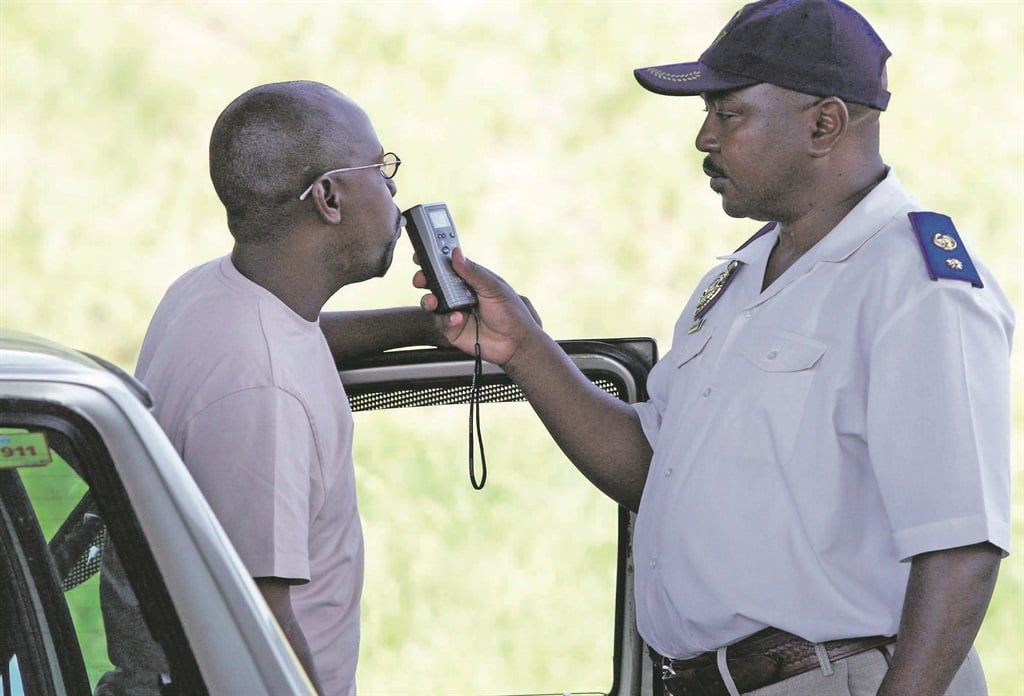
People caught driving under the influence (DUI) may have a chance of walking free this festive season because laboratories are struggling to cope with a large backlog of blood samples.
The country’s four forensic chemistry laboratories – in Durban, Cape Town, Pretoria and Johannesburg – are still struggling to analyse a backlog of 18 969 blood samples taken from alleged drunken drivers from the 2014 festive season, according to figures from the national health department.
During last year’s festive season, 48 619 blood samples were sent to the laboratories for analysis, of which only 29 650 have been analysed so far.
The 2015 samples will pile on the backlog, as more drink-driving arrests are expected. The Road Traffic Management Corporation (RTMC) says drunken driving accounts for 89% of the country’s fatal crashes.
In South Africa, the legal limit is a breath alcohol content of 0.24mg per 1 000ml, or a blood alcohol limit of 0.05g per 100ml. For a 68kg person, this translates to a maximum of one unit of alcohol – two-thirds of a can of beer, 75ml of wine or one tot of whiskey – per hour.
RTMC spokesperson Simon Zwane said: “The delay [of processing blood samples] affects compliance negatively since it confirms the notion that the offenders can get away with everything and nothing will be done to them.
“It also increases the perception that there is no justice, since people are not seeing justice being done.”
Blood alcohol results are crucial for prosecutors and police to secure convictions and harsh sentences for drunken drivers. But so many unprocessed blood samples frustrate prosecutors because they delay trials and force magistrates to throw out cases due to lack of evidence.
National Prosecuting Authority spokesperson Luvuyo Mfaku, however, said withdrawn cases could be reinstated when outstanding blood test results came back.
“We do withdraw cases where the blood alcohol reports have been outstanding for an unreasonable period. When the reports become available and the evidence justifies prosecution, summonses are then issued for the person to appear in court,” he said.
Mfaku said the situation would improve with the reintroduction of breathalyser testing.
National police spokesperson Brigadier Vishnu Naidoo said: “As much as we would want to investigate cases quicker, we would not want to compromise quality.
“Cases are taken off the court roll pending results and we reinstate them when they come back. The delay does not have a negative impact on a case.”
Health department spokesperson Joe Maila said a new laboratory in Durban, which was opened in April, had made a huge difference in reducing backlogs from the Eastern Cape, which had previously been sent to Cape Town and Pretoria.
“One concern is that the volume of cases continues to increase. While it is good that more people are being tested, it is of concern that there is possibly an increase in the number of people driving under the influence of alcohol,” said Maila.
He said new equipment was installed in the laboratories to increase the number of specimens being processed.
“All the laboratories will be operational over December and January. The department has embarked on various operational efficiencies to increase the number of specimens processed and to reduce the backlogs.
“Minimum standards (to expedite the processing of samples) have been set and are being followed,” said Maila.
The Cape Town and Durban laboratories, Maila added, had no backlogs and, with the new interventions, the turnaround time for processing blood alcohol tests in the Johannesburg and Pretoria laboratories was expected to be four weeks.
Drunken drivers can avoid a prison sentence or fine and opt to subject themselves to a behavioural change programme.
The National Institute for Crime Prevention and the Reintegration of Offenders (Nicro) is offering programmes that can be used by courts as an alternative to imprisonment.
The programmes are designed to improve the offender’s awareness of the dangers and consequences of drunken driving as well as reckless and negligent driving.
They include counselling and the Road Offences Panel Programme (ROPP), a behavioural and psycho-educational programme that helps offenders to address the behaviours that caused them to drive while intoxicated in the first place.
“Drunken driving is a very serious offence and offenders are often sentenced to direct imprisonment,” said Nicro CEO Soraya Solomon.
“However, the ROPP allows suitable offenders to participate in programmes and carry out their sentences in the community.
“Offenders can be referred to Nicro through two channels. The first channel is after being found guilty and sentenced – such offenders will then have a criminal record – or they are referred pretrial or through adult diversion, and then do not have a criminal record,” she explained.
Solomon said Nicro believed incarceration was not the best option for offenders who had been convicted of drunken driving.
“Not only does sitting behind bars without structured rehabilitation interventions do nothing to change a person’s behaviour, but also, being locked up with hardened criminals who exhibit extreme criminal behaviour and thought patterns hardly serves as an encouragement to change behaviour,” she said.




 Publications
Publications
 Partners
Partners








